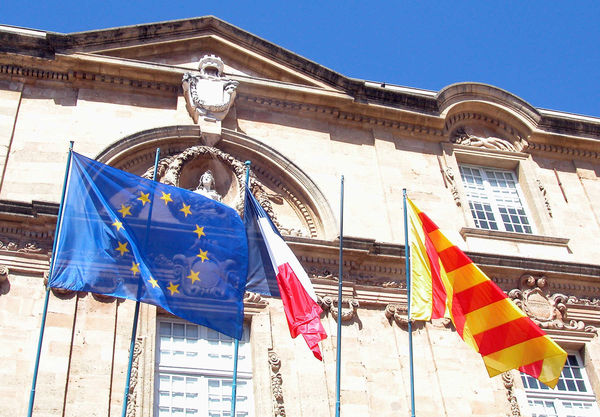Three Flags Over Europe
By Rick Steves
One of the things that charms me about traveling through Europe is its ethnic variety. Hop on a train and two hours later you step into a different culture, different language, and different heritage.
When Europe was undergoing the most dramatic phases of becoming more politically and economically united, I feared its ethnic diversity would be threatened. But I've since found that just the opposite is happening. In Europe there are three loyalties: to your region, to your nation, and to Europe. Ask a person from Munich where he's from and he'll say, "I'm Bavarian," or "I'm German," or "I'm European," depending on his generation and his outlook. Ask somebody from Barcelona, and she'll say, "I'm Catalunyan," or "I'm Spanish," or "I'm European," depending on her viewpoint. These days city halls all over Europe fly three flags: regional, national, and European.
In our lifetime, we've seen terrible violence as regions have challenged nations. Most of the terrorism — whether Basque, Irish, Catalunyan, or Corsican — has been from separatist movements. Fortunately, change doesn't always come with guns and bombs. Czechoslovakia, which once united two cultures and languages, peacefully split apart into the Czech Republic and Slovakia in 1993.
Modern political borders are rarely clean when it comes to dividing ethnic groups. Brittany, the westernmost region of France, is not ethnically French. People there are Celtic, related to the Welsh and the Irish. Just a couple of generations ago, Paris was so threatened by Bretons that if you were a parent in Brittany and you gave your child a Breton first name, civil servants refused to put it on the birth certificate. That would be laughable today.
When I first visited Barcelona, locals were not allowed to speak Catalan, wave the Catalan flag, or dance their beloved sardana. Now, in public schools, children speak Catalan first. And every Sunday in front of the cathedral, locals gather in a circle to dance the sardana, celebrating their Catalunyan heritage.
The little languages across Europe are actually thriving. More people are speaking Irish now than a generation ago. In 1999, Scotland convened a parliament in Edinburgh for the first time since 1707. Six years later that parliament passed a law to encourage the use of Scottish Gaelic, and now even the BBC does radio broadcasts in the ancient Scottish tongue as well as English.
What has changed? Brittany no longer worries Paris. Scotland isn't a problem for London (most of the time, at least). Catalunya…well, time will tell. But the national capitals realize their governmental power is waning. Looking for clout? Brussels has it — as the head of the European Union. And the EU is excited not about the political boundaries that divide people often without regard to their ethnicity, but about regions.
I've got a friend who is the Indiana Jones of archaeology in Austria's Tirol region. When he wants money to renovate a castle, he doesn't go to Vienna — he goes to Brussels. If he tells the EU, "I'm doing something for Austria," he'd go home empty-handed. So he says he's doing something for the Tirol (an ethnic region that incorporates parts of Italy and Austria). He gets money from Brussels because the EU is promoting ethnic regions over modern political entities.
The smaller ethnic groups support each other as well. In Barcelona, a local told me, "Catalunya is Spain's Quebec. We don't like people calling our corner of Iberia a ‘region' of Spain...because that's what Franco called it. We are not a region. We are a nation without a state."
It's no surprise that these little underdog ethnic groups feel a certain degree of solidarity. It factors into the way they travel: On a recent trip to North Ireland I was impressed by how many travelers I met from Spain's Basque region and Catalunya. Because the Basques and Catalunyans feel a kinship with the Catholics of Ireland's Protestant North, they choose to vacation in Ulster. And it even factors into the way they eat: Catalunyans in Barcelona take a certain joy in eating at Basque bars and vice versa.
On that same Irish trip, I saw Israeli flags flying from flagpoles in Protestant communities all over Northern Ireland. Understandably, the Protestants — encouraged by a bigger power (England) to settle in Ulster four centuries ago — are having a tough time with their indigenous neighbors. Right or wrong, good or bad, it doesn't matter. The Irish Catholics still regard them as "settlers." So Ulster's Protestants empathize with Israeli settlers living in the West Bank, who are having a similarly difficult time with their neighbors.
By traveling thoughtfully, we gain an appreciation for the modern struggles of Europe's fascinating ethnic mix — and empathy for its underdogs.

